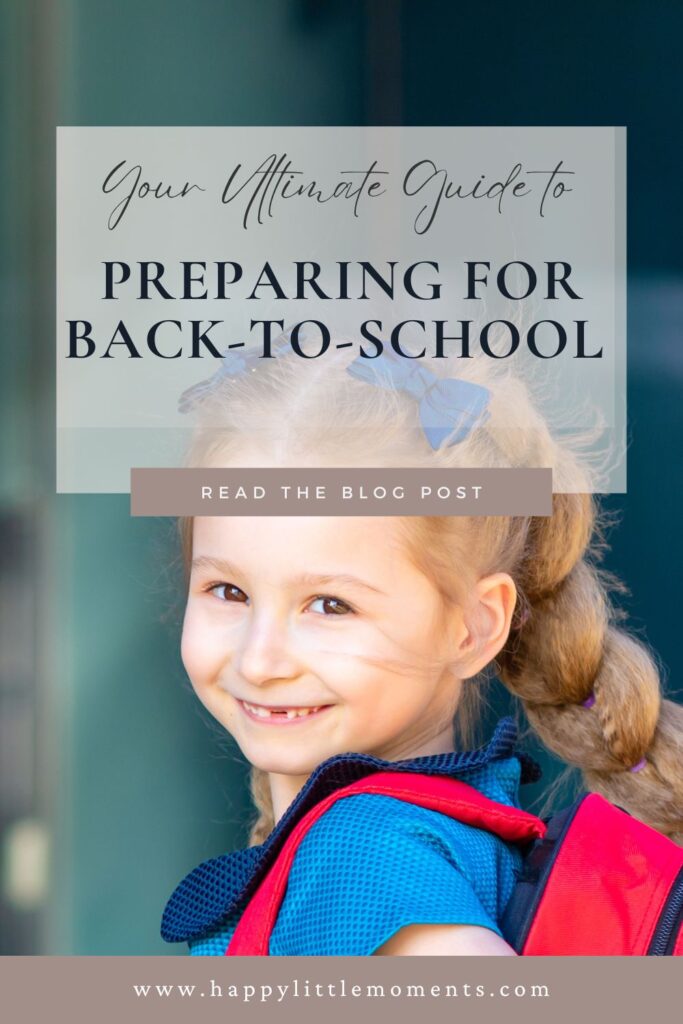Your Ultimate Guide to preparing for Back-to-school
It’s hard to believe that summer is nearly over, and we’re already preparing for back-to-school time. This year, we’ve been fortunate enough to spend lots of time with our kids. Over the summer, we traveled, rested, toured our city, went to camp, went camping, and then we all got sick, which is why I haven’t posted for a couple of weeks!
However, we’ve made the best of our summer. Alas, even the best of times must come to an end, as new beginnings help us appreciate the memories we’ve made. As we are preparing for back-to-school, we are counting down the days to the beginning of the school year.
Although it’s bittersweet for everyone, back-to-school time is an exciting time for you and your children, and it’s important to help your children ease into the transition of returning to school this year. I’ve created a list of ways to help your child through this transition!
12 Tips for Preparing for Back-to-School
1). Adjust your child’s routine. At least 2 weeks before school starts, begin adjusting your child’s schedule. Begin by slowly shifting their bedtime and wake-up hours to align with their school schedule. If this summer they’ve been staying up later, begin adjusting their bedtime by 15-minute increments each day until you reach your desired “back to school” bedtime.
2). Teach your child organizational skills. Back-to-school time is a great time to discuss how to be and stay organized, keep track of assignments through notebooks (depending upon their age), and keep all of their supplies in order. To help your child create great habits, these conversations will likely need to happen throughout the school year, too.
3). Create a visual schedule for school days in advance, so your child knows what to expect once school begins. A few days before school starts, do a practice run in the mornings and the evenings to see if anything in your planned schedule needs to be adjusted, especially during the morning rush!
4). If it isn’t already part of your routine, make reading before bed a part of your nightly routine. Reading to your child daily makes a huge difference in their academic performance. Literacy is simply crucial to academic success, and tiny literacy gains are made every night you consistently read to your child. Generally, good literacy skills lead to doing better academically, boosting your child’s overall self-esteem and confidence at school.

Kickstart a Review with Your Child
5). Start reintroducing school work gradually. During the school year, my children have designated “homework” time, even if they don’t actually have homework that day. Naturally, it’s a time to get any homework completed if they have it. But if they don’t have homework, we go over flashcards, writing practice, reading, or literacy prep together. Or alternatively, we choose an educational activity from a bookshelf with puzzles, games, workbooks, and many other learning activities. Our “homework time” is also a time when my children connect with me (or their dad), because one of us is there helping them with their educational activities.
Even though it’s still summer, select a short time each day to do learning activities with your child for the remainder of the summer. You don’t have to make this time lengthy. For example, our summer educational time together is about 15-20 minutes daily.
6). Review some of the academics your child learned last year. Doing a little review here and there will help them have more confidence as they get ready for the school year to come. Also, this is a great opportunity to recognize their previous school achievements, which will boost their confidence, too.
Start Conversations About the Upcoming School Year
7). Talk about going back to school in a positive light. Encourage your child to be excited about going back to school. Take the opportunity to set them up for success by going over topics they may learn about soon or give them a head start on them. Currently, my daughter is working on her cursive writing and subtraction tables because we know those will be things they will be tackling in 2nd grade. My son, who is going into Kindergarten this year, is working on basic reading skills, phonics, blending sounds together to make words, and basic writing skills.
8). Go over your school’s rules and behavior expectations to refresh your child’s memory. Before school starts, have a heart-to-heart discussion about what it means to be respectful, why it’s important to listen to your teacher, review how we follow instructions, and talk about hand-raising in class. Keep it positive, but stress the importance of following the school’s rules for their safety and the safety of their friends.
9). Discuss any changes that are happening with your child’s new school. Talk to them about their new teacher, any changes to staffing, or any improvements made at the school over the summer. For example, our school is currently undergoing a massive overhaul of its playground this summer. Unfortunately, it won’t be complete until after school starts, but it’s a pretty exciting topic to discuss at the dinner table.
Make it fun
10). Start a Back-to-School countdown with your child. If you love to be creative, create a visual countdown to help build excitement about the beginning of the school year. Take some time to talk with them about their friends whom they may not have seen all summer.
11). Go shopping for school supplies with your child. Make shopping for school supplies a highlight for your child and amp up the anticipation of the beginning of the school year. Let them pick out their backpacks, folders, and notebooks. Don’t forget the school-provided list, but let your child select the designs for each item when possible.
12). Read books together about going back to school. Reading is a great way to start addressing those back-to-school jitters by reading about going back to school. Or, if your little one is about to enter Kindergarten, you can read books about going to school for the first time. Reading gives you the opportunity to talk through any fears your child may have about going to school. Here are a few back-to-school suggestions:

Preparing for Back-to-School Jitters
Remember, it’s only natural for your child to feel nervous or anxious about going back to school this year. Personally, I remember having some jitters before the school year began in elementary school! I’m sure you do, too, so addressing back-to-school jitters with compassion is important. Listening to your child’s concerns will help them cope with their fears.
Encourage your child to reframe their jitters into excitement for the upcoming year ahead. There will inevitably be exciting adventures on the horizon. Helping them build their confidence, giving them coping tools for any nervousness, and encouraging them to have the courage to face their fears at the beginning of the school year will also serve them well into adulthood.
Save this post for later! Click here to save to your Pinterest Account!



